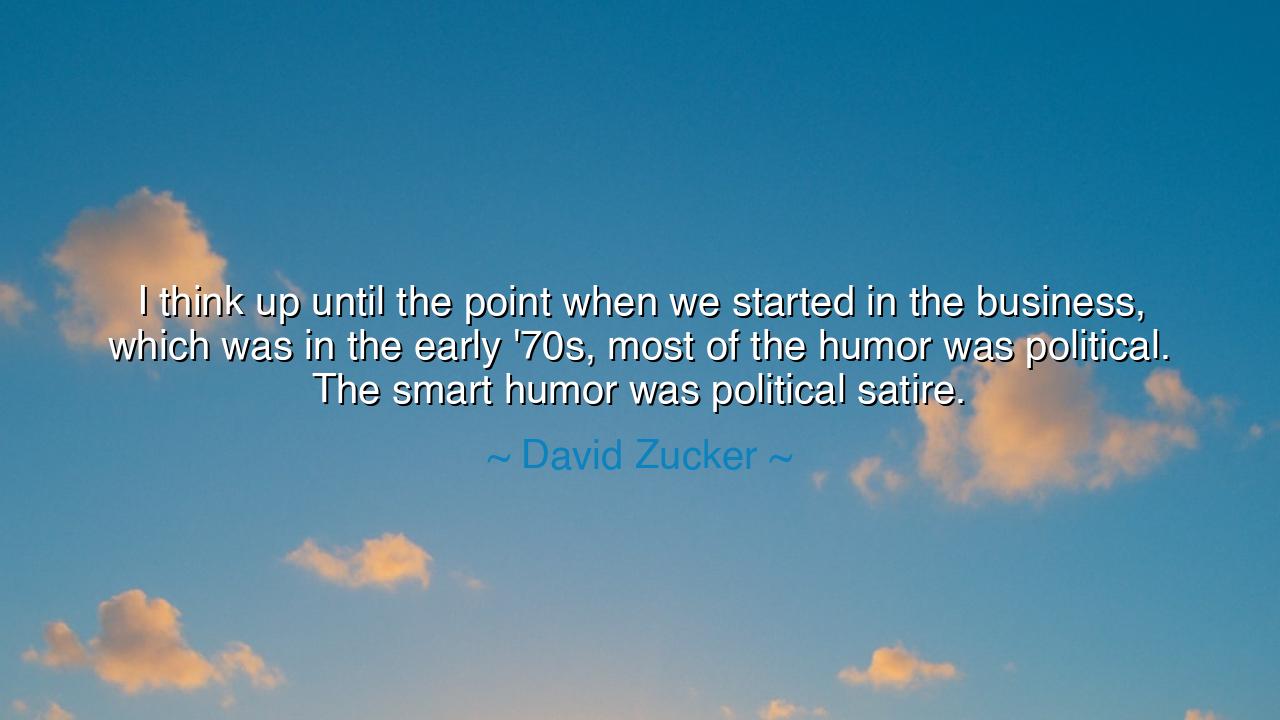
I think up until the point when we started in the business, which
I think up until the point when we started in the business, which was in the early '70s, most of the humor was political. The smart humor was political satire.






The filmmaker David Zucker, one of the great architects of modern cinematic comedy, once reflected: “I think up until the point when we started in the business, which was in the early ’70s, most of the humor was political. The smart humor was political satire.” In these words lies not only an observation about the history of laughter but a revelation about its evolution — how humor, like civilization itself, changes with time, reflecting the fears, dreams, and struggles of the age that creates it. Zucker, who helped birth the anarchic brilliance of Airplane! and The Naked Gun, speaks here as both artist and historian. He reminds us that humor is a mirror — one that once reflected the struggles of nations, and later turned to reveal the absurdity of everyday life.
In the early decades before Zucker’s rise, political satire reigned as the highest form of wit. It was the humor of intellect and resistance — a blade wrapped in laughter, cutting through the hypocrisy of power. From the stage of Jonathan Swift to the pages of Mark Twain, from the stand-up of Lenny Bruce to the sketches of That Was the Week That Was, the sharpest minds wielded comedy as a weapon of truth. It was “smart humor,” as Zucker calls it, not because it was elitist, but because it demanded courage and clarity. It taught audiences not just to laugh, but to think, to question authority, to see beyond propaganda and pride.
Yet as Zucker and his companions entered the scene in the 1970s, the world’s tone began to shift. The wars, the protests, the movements of the 1960s had left exhaustion in their wake. The people were weary of division and seriousness. The soul hungered for laughter that did not accuse, but released — for humor that transcended politics and spoke to the sheer madness of existence itself. In that void, Zucker and his collaborators offered something revolutionary: comedy of chaos, laughter born not from ideology but from absurdity. Their humor was universal, pure, and gloriously foolish — yet, in its own way, just as smart, for it revealed the fragile vanity of all human seriousness.
The ancients, too, knew this rhythm — the pendulum between satire and silliness. In the theater of Aristophanes, the great Greek playwright, laughter mocked both gods and men. His Lysistrata ridiculed war and politics, yet his The Clouds laughed at philosophy itself. His audiences learned that humor can both teach and cleanse — that laughter may serve as rebellion in one age and as healing in another. What Zucker and his peers rediscovered in the modern world was this second truth: that when society grows weary of weighty ideas, the fool becomes the true teacher. In his simplicity, he restores balance to the soul of culture.
To call the political humor of the past “smart” is not to say that the humor of Zucker’s era was not — rather, it is to recognize that intelligence wears many masks. Political satire exposes corruption; absurd comedy exposes the absurdity of life itself. One laughs at kings, the other at chaos. But both spring from the same divine source: the human need to find meaning through laughter. Zucker’s revolution was not a rejection of intelligence, but an expansion of it — a reminder that humor need not always be political to be profound. Sometimes, to make sense of the world, we must simply surrender to its ridiculousness.
The lesson, then, is timeless: laughter evolves as the heart of humanity evolves. In times of tyranny, humor must be sharp and satirical; in times of confusion, it must be light and liberating. Each generation must find its own balance between wit and wonder, between critique and play. The wise understand that all forms of laughter — from the biting jest to the belly laugh — serve a sacred purpose: they keep the human spirit free.
And so, remember this: humor is both shield and torch. It guards the soul from despair and lights the way toward understanding. Whether through satire that exposes or silliness that soothes, laughter remains one of the purest acts of defiance against chaos and sorrow. David Zucker’s words remind us that to make people laugh — whether at power or at themselves — is to give them hope. For in laughter, the human spirit finds its truest rebellion and its most enduring grace.






AAdministratorAdministrator
Welcome, honored guests. Please leave a comment, we will respond soon